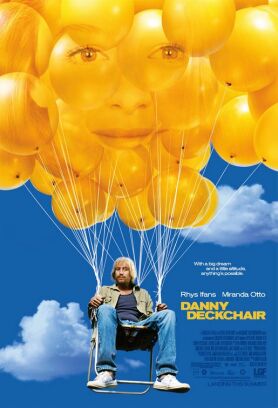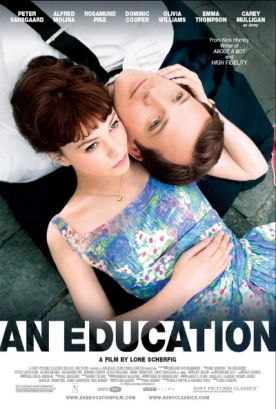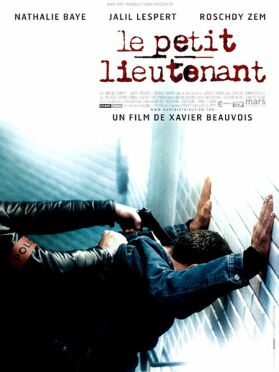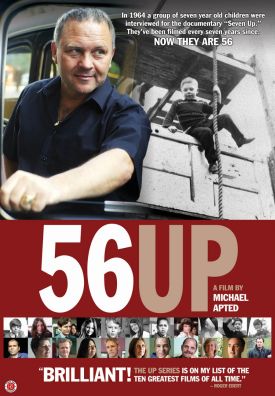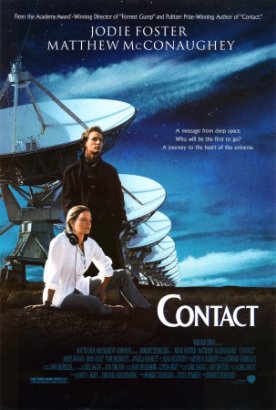Danny Deckchair
In Danny Deckchair Jeff Balsmeyer, directing his first feature film (for which he also wrote the screenplay), has given us the sort of Australian whimsy that will be familiar to the fans, among whom I count myself, of Rob Sitch (The Castle, The Dish) or P.J. Hogan (Muriel’s Wedding, Peter Pan). Mr Balsmeyer’s whimsy, however, though it is executed with style and wit, does not produce laughs so loud and so long as they are in the films of Messrs. Sitch and Hogan, and the material doesn’t have the same sort of edge to it. Instead, it goes all earnest at the end and tries for a bit of uplift and moral improvement which I think the movie would have been better without.
Danny Morgan (Rhys Ifans), is a concrete pourer on Sydney building sites and regarded as nice but a bit of a loser by his friends and even his live-in girlfriend, Trudy (Justine Clarke), who works in a real estate office. He can’t wait for his holiday when he plans to go camping with Trudy. But Trudy, who doesn’t want to go anyway, suddenly finds herself thrown together with dishy TV reporter Sandy Upman (Rhys Muldoon). “Danny’s a cement man,” Trudy tells a girlfriend. “He’ll always be a cement man; he’s one of the little people.” Unlike rising media star Sandy, for instance. Rather than break a date with Sandy to show him a house — and maybe get some lunch — Trudy pretends that a work emergency requires her to cancel the camping trip.
Danny, disconsolate at missing the trip he has so looked forward to, mopes around the house and begins to get strange ideas. “Give him some time home alone and he starts climbing the walls,” says Trudy to a girlfriend. “Every night I come home and he’s doing something weird.” The ultimate in weirdness comes when Danny ties a bunch of helium-filled balloons to a lawn-chair just to see how high it will take him. When some friends who have come over for a “barbie” inadvertently let the chair go with Danny in it, he floats high into the sky and disappears from sight. Rather improbably, Danny becomes a media phenomenon in his absence. Trudy, now thrown together with Sandy Upman because he is reporting the story, appears nightly on television as a tearful victim and is boosted by Sandy and his colleagues at “Oz 11” as a popular heroine.
But while she is becoming a media hero, Danny is becoming something more like a real one. His chair finally descends to earth when he is hit by the fireworks display accompanying the Macadamia Nut Festival in the rural paradise of Clarence. There, for a variety of reasons, and on account of a certain amount of misunderstanding, Danny instantly becomes the most popular man in town. And he meets a much sweeter and nicer girl than Trudy in Glenda (Miranda Otto), the local meter maid, whose yard he has fallen into. Oblivious almost throughout of the intense interest the Sydney media have been taking in his disappearance, he suddenly and unexpectedly finds that he has a chance to make an entirely new start in life and perhaps to end up as something more than “one of the little people” — until he realizes that, really, there are no little people.
Well, you can see where this is going. Not that it’s not OK for the movie to have a spiritual and uplifting character, even a “message,” but there is just a little too much of the Norman Vincent Pealish about this message. Danny has come to think of himself as a loser, and it takes the accident by which he becomes a somebody to the people of Clarence to teach him that he really is a somebody. Like the “self-esteem”movement to which the moral of the story clearly owes something, this leaves me a bit dubious. I guess the problem is that we don’t see enough either of Danny’s life in Sydney to know what it is he is getting away from, apart from Trudy, or of Clarence to see what he is getting away to, apart from Glenda. In the end it seems like an awful lot of trouble for Danny to have to go through just to find a girl who likes to go camping. But if you don’t think too hard about it, you’re likely to find the movie a lot of fun. I know I did.
Discover more from James Bowman
Subscribe to get the latest posts to your email.

